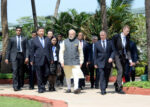According to Section 377 of the Indian Penal Code, which forbade “carnal intercourse against the order of nature,” same-sex partnerships were until recently regarded as crimes in India.
An important ruling by the Indian Supreme Court in 2018 reversed this discriminatory legislation and recognized the rights of LGBTQIA+ people.
Although there has been progress, India still has a large LGBTQIA+ population that is subject to prejudice and marginalization. Transgender people, in particular, frequently lack access to basic rights and dignity as well as significant barriers to healthcare, education, and job possibilities.
Therefore, it is essential to reconsider the rights of LGBTQIA+ groups, as well as to consider their difficulties from a distance and progress toward inclusivity.
What is the background of LGBTQIA+ acceptance in India?

In accordance with Section 377 of the Indian Penal Code, British citizens believed that all gay actions were “against the order of nature” and were therefore illegal.
The World of Homosexuals, written by Shakuntala Devi, was the first book on homosexuality to be released in India.
2 As a third sex, they obtained formal voting rights in 1994.
The Supreme Court of India decided in 2014 that transgender persons should be regarded as the third gender category. The LGBTQIA+ group in this nation was granted the right to declare their sexual preference in safety by the Supreme Court in 2017.
Sexual orientation of a person was safeguarded by the right to privacy.
On September 6, 2018, the Supreme Court overturned the portion of Section 377 that made consenting to gay behavior a crime.
In order to safeguard transgender people’s rights, their wellbeing, and other connected issues, Parliament passed the Transgender Persons (Protection of Rights) Act in 2019.
What are the difficulties the LGBTQIA+ community in India is facing?

LGBTQIA+ people frequently experience social prejudice in a variety of spheres of their lives, including the job, housing, and healthcare.
They may find it challenging to live freely and securely as a result. Discrimination can also result in fewer employment prospects, destitution, and a shortage of essentials.
Lack of Representation: Members of the LGBTQIA+ community are frequently underrepresented in the media, legislation, and government, as well as in general culture.
As a result, it might be challenging for them to be understood and have their requirements met. Lack of comprehension and acceptance of the group may result from this underrepresentation.
LGBTQIA+ people frequently experience hate crimes, such as bullying, intimidation, and physical and emotional abuse. See Bracket of Mental Health Issues. The society may become fearful and uneasy as a result, which could harm both bodily and mental health.
Unheard views of Rural LGBTQIA+: There are a number of online and offline venues where the views of metropolitan LGBTQIA+ people can be heard.
However, rural LGBTQIA+ people frequently repress their emotions due to a lack of exposure, comfort, and internet access because declining to marriage results in additional abuse.
Homelessness: The majority of LGBTQIA+ children who are homeless were either expelled from their homes due to their sexual orientation or fled to avoid violence.
They are deprived of social and educational assistance during crucial early years.
What should the next step be?

Supportive Laws and Policies: The government can enact supportive laws and policies that shield LGBTQIA+ people from prejudice, violence, and hate crimes.
Examples of this could be laws that safeguard transsexual people’s rights and regulations that guarantee access to healthcare that is considerate of the requirements of the LGBTQIA+ community.
Aiming for Better Parenting: Since our parents are the nearest to us in the human social structure, they must be receptive to their children’s identities if society is to welcome variety and value each child’s individuality.
Our Diversity, Our Pride: It’s critical to establish a welcoming environment where LGBTQIA+ youth can communicate, exchange ideas, and work together. Platforms like Gaysi and Galaxy have aided in the development of these areas.
Through these venues, the Pride Month and Pride Parade Initiative should be supported at all levels.
From Special Treatment to Equal Treatment: It’s important to realize that people who identify as LGBTQIA+ are not foreigners, they are not ill, and their sexual preferences are inherent. Being gay is a common occurrence, not a handicap.
They should be regarded equally, not differently, and once they are integrated into Indian culture as equals, they will completely contribute to the growth of the country as a whole.

